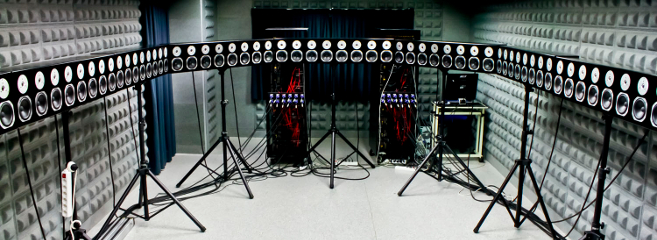The main challenge for researchers, independently from their field, is to contribute to scientific advances that have an impact on the quality of life of citizens. The "smart" concept, so widely used, includes in itself this goal and, in this sense, it has been used in the title of the proposed project. The generic concept of smart sound processing is here included to define the intelligent generation and/or capture of sound signals by means of signal processing/computing devices potentially heterogeneous, distributed and of massive use. This approach, together with network intelligence at different levels, is able to manage data, to make decisions and to configure capture/reproduction/computing devices.
This project aims to develop systems based on the smart sound processing paradigm using the concept of Living Lab. We want to migrate from conventional laboratories to real life scenarios, solving social, human and daily life problems in: entertainment, communication, assistance to people with special needs, security, welfare, etc. In all cases, we propose to design applications that use smart sound processing, with the idea of generating applied, multidisciplinary and high-standard scientific knowledge.
Nowadays, we assist to the boom of applications for personal use devices and their massive extension in parallel with the advances of communications and computing: human-machine interfaces, control systems, positioning and tracing systems, telepresence, automatic classification, high speed communications, entertainment, surveillance, etc. The proposed research is focused on a collection of specific applications of socio-economic interest designed for maximizing its social implications and its integration into the present and future reality of the digital society.
In general terms, this project is focused on the development of analysis and synthesis systems based on sound environments and scenes that make use of a network of acoustic nodes in an intelligent and computationally efficient way. Concretely, the following objectives/developments will be addressed: conformation of virtual sound environments with multinode and distributed control systems, definition of interactive virtual scenes (particularly for music: distributed technologic concerts, virtual accompaniment, etc.), analysis of sound scenes for detection, positioning and classification of sound events and the development of systems for hearing aid and intelligibility improvement. In summary, this project addresses the design and implementation for smart sound processing of products, systems, computer programs and algorithms of signal processing and communications that make use of last generation architectures, advance computing and efficient communications.
This coordinated project includes researchers from five Spanish universities with previous experience in coordinated projects of related topics. The proposed project has the support (as EPO, observatory promoter entity) of some companies and administrations, which will enable the spreading and applicability of the results and will maximize the commercial outputs. It must be stressed the interest of local administrations for the development of sound applications under the smart city paradigm. This support will guarantee the experimentation in living lab environments and the visibility of the results.
Project Information
| Title | SMART SOUND PROCESSING FOR THE DIGITAL LIVING |
| Acronym | SSPRESSING |
| Reference | TEC2015-67387-C4-1-R (MINECO/FEDER) |
| Funding body | Ministerio de Economía, Industria y Competitividad |
| Execution | 01-01-2016/31-12-2018 |
| Project coordinators and Principal investigators | Alberto González Salvador María de Diego Antón (Universitat Politècnica de València) |
